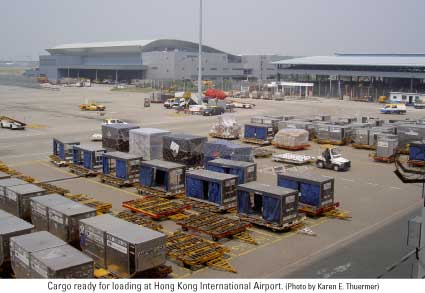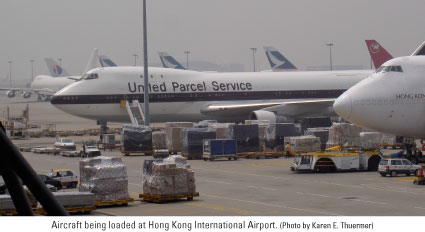By Karen E. Thuermer, AJOTThe figures are staggering. China’s trade surplus could top US$120 billion in 2006, up over 22% from estimated 2005 figures of US$97.4 billion, according to China’s State Information Center. With so many goods now being produced in China, the tarmacs are overflowing with Chinese-made goods.

While manufactures worldwide are taking advantage of China’s cheap costs by outsourcing much of their production to China, logistics remains the critical and expensive part of the equation. Goods from the Pearl River Delta (PRD) region—the world’s fastest growing manufacturing base and China’s largest export center, need to move fast—especially if designated for air shipment. Furthermore, the Guangdong Statistical Bureau reports that in 2004, 26.88% of the manufacturing industries in Guangdong Province encompassed electronics and telecommunications equipment, industries particularly dependent on fast transport.
Key to satisfying this supply chain need (and also contributing to the growth of these and other industry groups) is Hong Kong International Airport (HKIA) and services offered by Hong Kong Air Cargo Terminals Limited (Hactl). HKIA handles 90% of all PRD air freight and is the world’s No. 1 airport in terms of international air cargo throughput, a ranking it has held since 1996.
HKIA has very little competition in the region, despite the 2004 opening of Guangzhou’s Baiyun International Airport. In fact, according to Warren Bishop, Hactl corporate development director, HKIA handles 3.1 million tons annually, compared to Baiyun’s 100,000 tons. When shipments need to move fast and throughout the world, they transit via HKIA. The reason is the airport’s extensive connectivity, vast number of flights, and superb cargo handling facilities.”
“HKIA’s business is built on its connectivity and reliability,” states Bishop.
At the forefront of those facilities is Hactl, the largest air cargo terminal at HKIA. From its headquarters at SuperTerminal 1, Hactl provides reliable physical cargo handling service to import, export and transshipment cargo. The six-level terminal has the potential to handle 3.5 million tons of air cargo per year.
Hactl’s wholly-owned subsidiary, Hong Kong Air Cargo Industry Services Limited (Hacis), offers some of the most sophisticated supply chain management solutions in the region: intermodal transport, cargo delivery and information services. Add to that fast border crossing, its competitive pricing, flexible truck schedules, enhanced cargo tracking facilities, and proven experience.
Although Hacis was formed in 1984, its breadth of services has been expanded thanks to the Closer Economic Partnership Arrangement (CEPA), which took effect in January 2004 and was further enhanced in January 2005. CEPA allows Hong Kong companies to set up wholly-owned enterprises to provide logistics services in Mainland China, including transportation, storage, loading and unloading, value adding, packing, delivery and related information management and consultancy services for ordinary road freight; freight forwarding services within the Mainland; and the management and operation of logistics services through electronic means. Since China has not made any WTO commitment for logistics services, Hong Kong‘s logistics companies now have a unique advantage over their foreign counterparts.

“We can match any product going to Guangzhou’s Baiyun Airport,” says Warren Bishop.
Its SuperLink China Direct service provides one-stop-shopping cargo services that include seamless road connections between the PRD via its customs-bonded air-road intermodal transport services.
“The benefit to SuperLink is its links to manufacturing zones in Mainland China,” states Bishop.
The service offers simplified transport



